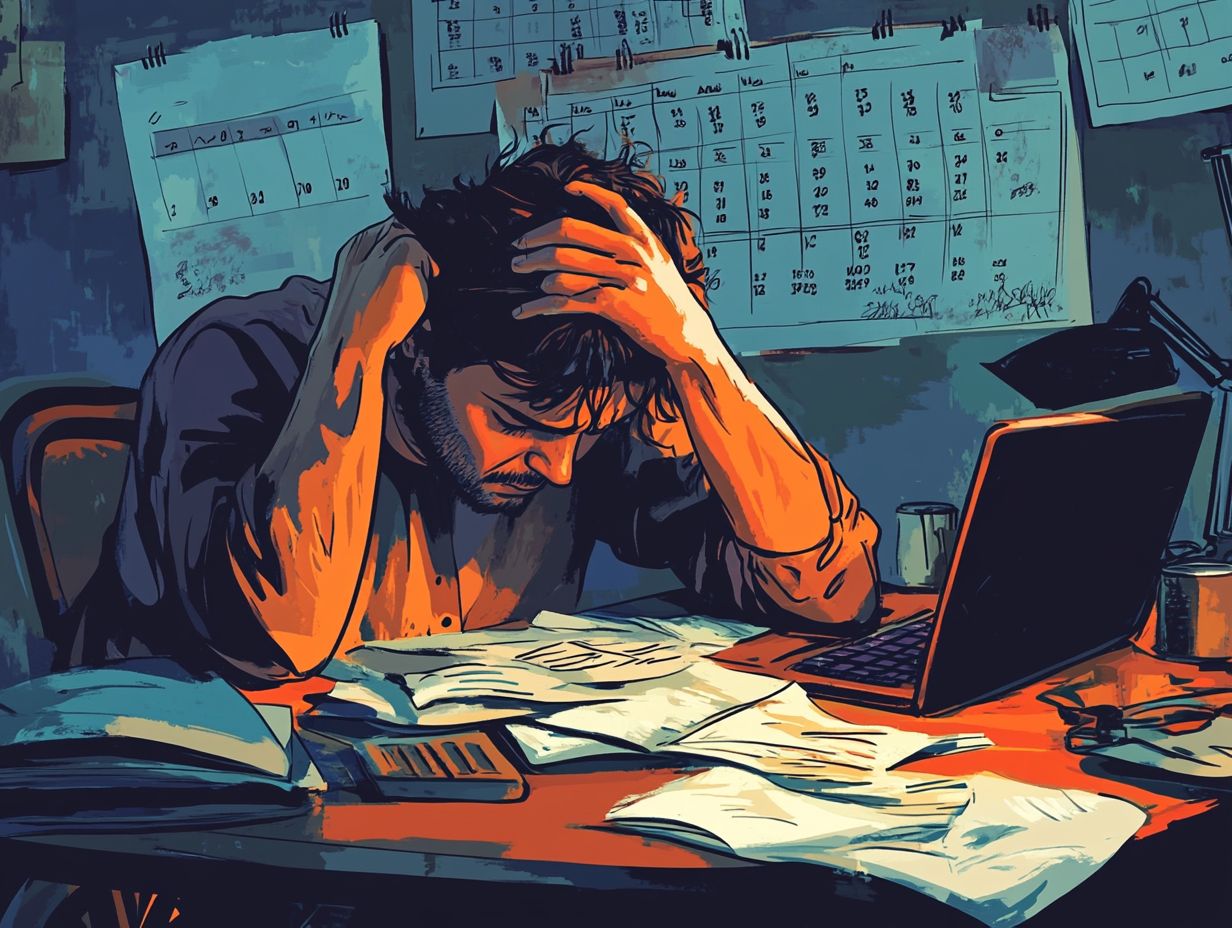Understanding the Fear of Failure in Procrastination
Procrastination is a common issue. However, its causes are often more complex than just laziness.
At the core of this struggle is a profound fear of failure. This article explores the intricate relationship between procrastination and the anxiety of not living up to expectations both your own and those imposed by others.
You will also find definitions for these concepts, an exploration of the psychological factors at play, and an examination of their significant impact on productivity in both your professional and personal life.
Practical strategies to overcome these obstacles are also included, along with guidance on when to seek professional assistance.
Are you tired of pushing tasks aside because of fear? This article is just what you need to break free!
Contents
- Key Takeaways:
- The Link Between Procrastination and Fear of Failure
- How Fear of Failure Leads to Procrastination
- The Impact of Fear of Failure on Productivity
- Overcoming Fear of Failure and Procrastination
- Seeking Professional Help
- Therapy and Counseling Options
- Frequently Asked Questions
- What is the fear of failure in procrastination?
- How does the fear of failure contribute to procrastination?
- What are some signs of the fear of failure in procrastination?
- Can the fear of failure be beneficial in procrastination?
- How can one overcome the fear of failure in procrastination?
- Is it possible to completely eliminate the fear of failure in procrastination?
Key Takeaways:

- The fear of failure often drives procrastination, affecting productivity and growth.
- Factors like perfectionism and low self-esteem link fear of failure to procrastination.
- Seeking help, like therapy, can empower you to overcome these challenges.
The Link Between Procrastination and Fear of Failure
The intricate relationship between procrastination and the fear of failure reveals itself in various aspects of your life, especially during the writing process. Here, you often face deeply rooted fears, such as the dread of negative evaluation and rejection.
This connection isn t just psychological; it highlights various mental health challenges where perfectionism stifles your progress. Take inspiration from Joanne, the celebrated author of Harry Potter; her journey underscores that overcoming procrastination requires understanding these fears.
By adopting a growth mindset and using simple ways to change your thinking, you can reclaim your productivity and unlock your creative potential.
Defining Procrastination and Fear of Failure
Procrastination is putting off tasks, often driven by negative ways of thinking, negative self-talk, and deeper fears, especially the fear of failure. This fear can manifest as anxiety, ultimately hindering your sense of self-efficacy.
You might find that this tendency to delay responsibilities arises from an internal dialogue filled with doubt and pessimism, convincing yourself that you lack the competence to succeed. Negative ways of thinking, like all-or-nothing thinking or catastrophizing, only deepen the belief that failure is inevitable, creating a paralyzing fear that prevents you from taking action.
This chronic avoidance does more than affect your productivity; it gradually erodes your confidence. As your self-efficacy diminishes, anxiety tends to escalate, leading to a vicious cycle where you feel increasingly overwhelmed and less capable, perpetuating the procrastination habit.
How Fear of Failure Leads to Procrastination
The fear of failure can easily trigger a cycle of procrastination. You may delay tasks out of anxiety, leading to a reliance on maladaptive perfectionism that complicates your ability to take action. Understanding this dynamic is crucial, as highlighted in the link between procrastination and motivation.
This issue often stems from a psychological landscape where anticipating failure creates a mental block, pushing you to avoid tasks rather than confront your fears. On the other hand, embracing adaptive perfectionism can help you navigate your anxiety more effectively.
By employing cognitive restructuring strategies, you can redefine your perception of failure and enhance your approach to productivity.
Psychological Factors at Play

Numerous psychological factors play a pivotal role in the complex relationship between the fear of failure and procrastination, including your anxiety levels, thought patterns, and self-efficacy issues.
For example, heightened anxiety may surface when you encounter challenging tasks. This prompts you to sidestep your responsibilities.
This avoidance creates a vicious cycle, where thought patterns like catastrophizing or all-or-nothing thinking intensify feelings of inadequacy and erode your self-efficacy.
Research by Steel (2007) emphasizes that these thought patterns not only sap your motivation but can also instill a fear of judgment or ridicule, perpetuating procrastination further. Understanding these psychological dynamics helps you tackle anxiety and cognitive biases.
The Impact of Fear of Failure on Productivity
The fear of failure can profoundly affect your productivity, infiltrating both your professional and personal life. This anxiety creates an environment that stifles your performance and hinders your capabilities.
Recognizing its impact is crucial for reclaiming your focus and enhancing your effectiveness.
Effects on Work and Personal Life
Fear of failure can significantly disrupt your professional and personal life, leading to procrastination that negatively affects your mental health and overall performance.
You may find yourself hesitating to pursue goals or take on new challenges because of this fear. This results in missed opportunities that could have spurred your growth and success.
In the workplace, this often translates to avoiding projects or initiatives, which only increases your stress as deadlines approach and responsibilities mount. On a personal level, your reluctance to engage in new experiences or relationships can foster isolation, further magnifying feelings of inadequacy.
Recognizing this fear’s harmful effects is your first step toward a happier, more productive life! You can take proactive steps to confront your anxieties, ultimately setting the stage for improved well-being and enhanced productivity.
Overcoming Fear of Failure and Procrastination
Overcoming your fear of failure and procrastination requires a nuanced approach that weaves together several strategies.
By enhancing your mental health, nurturing a growth mindset, and using ways to change your thinking, you can effectively tackle these barriers and move forward with confidence.
Strategies and Techniques

There are numerous strategies and techniques at your disposal to conquer procrastination and fear, such as cognitive restructuring, fostering a growth mindset, and enhancing your self-efficacy.
By implementing these methods, you can transform your approach to challenges and setbacks, turning them into golden opportunities for personal growth. Cognitive restructuring invites you to shift your perception, encouraging you to see failures as valuable learning experiences rather than definitive endpoints.
This reframing is crucial, as it helps cultivate a growth mindset that embraces challenges and values effort.
Enhancing your self-efficacy the belief in your ability to succeed plays a vital role in strengthening your resilience. Consider practical tips like:
- Setting specific, achievable goals
- Utilizing positive affirmations
- Reflecting on past successes to boost your confidence
For example, think of a student preparing for exams who breaks study tasks down into smaller, manageable parts. Real-life examples, such as an athlete who rises from early failures to claim victory, illustrate the profound impact these strategies can have on your journey.
Seeking Professional Help
Seeking professional help can be an essential step in overcoming procrastination and fear. It opens the door to therapy, counseling, and life coaching opportunities that foster improved mental health and personal growth.
Embracing this support empowers you to navigate challenges with confidence and clarity.
Take the first step today! Challenge yourself to confront your fears and unlock your potential.
Therapy and Counseling Options
Therapy and counseling options are diverse, offering a range of approaches such as cognitive behavioral therapy, life coaching, and support from psychologists. These methods are designed to enhance your mental health while tackling procrastination and the fear of failure.
These approaches equip you with various tools to manage anxieties and boost productivity. Cognitive behavioral therapy (CBT) focuses on changing negative thinking patterns, enabling you to see the connections between your thoughts, feelings, and behaviors. Life coaching provides a goal-oriented framework, giving you the power to set realistic objectives and craft a structured plan to achieve them.
Additionally, psychologists may integrate mindfulness techniques, guiding you to remain present and alleviate overwhelming feelings tied to failure. By exploring these diverse options, you can uncover the most effective path to overcoming your challenges and nurturing your personal growth.
Frequently Asked Questions
What is the fear of failure in procrastination?

The fear of failure in procrastination is the anxiety or worry associated with the possibility of not being able to meet expectations or achieve desired outcomes. Understanding this fear can be crucial, as it often leads to a delay in starting or completing tasks, as discussed in understanding the role of fear in procrastination.
How does the fear of failure contribute to procrastination?
The fear of failure can create a paralyzing effect, making it difficult to take action and complete tasks. This avoidance leads to procrastination as a way to escape the fear of potential failure, highlighting the importance of understanding the psychological barriers to overcoming procrastination.
What are some signs of the fear of failure in procrastination?
Some signs include constantly putting off tasks, making excuses to avoid starting or completing tasks, and feeling overwhelmed or anxious when faced with deadlines.
Can the fear of failure be beneficial in procrastination?
In some cases, the fear of failure can motivate individuals to work harder and strive for success. However, when it becomes paralyzing and leads to procrastination, it can negatively impact productivity and overall well-being.
How can one overcome the fear of failure in procrastination?
One way to overcome the fear of failure is to reframe it as a learning opportunity rather than a reflection of self-worth. Setting realistic goals and breaking tasks into smaller, manageable chunks can also be effective strategies.
Is it possible to completely eliminate the fear of failure in procrastination?
While it may not be possible to completely eliminate this fear, it is manageable. By acknowledging and understanding it, individuals can develop coping mechanisms and techniques to reduce its impact, becoming more productive.
Ready to explore options for your mental health? Start your journey today!






